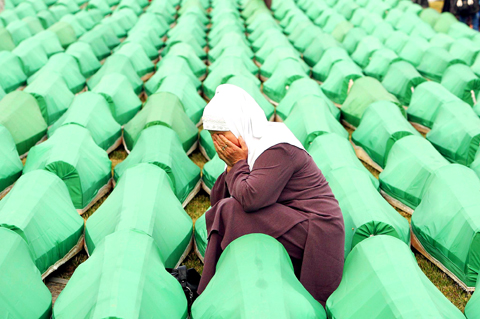Tens of thousands yesterday marked 15 years since the Srebrenica massacre of nearly 8,000 Muslims by Bosnian Serbs, the darkest episode of the violent break-up of Yugoslavia.
A special ceremony at the Potocari cemetery near Srebrenica, attended notably by Serbian President Boris Tadic and Turkish Prime Minister Recep Tayyip Erdogan, included the burial of 775 recently identified victims who joined the 3,749 already there.

PHOTO: EPA
On Saturday emotions ran high in the graveyard as the hundreds of coffins of those due to be buried arrived. In the hot midday sun a line of men formed to pass the coffins to the front.
On a small incline overlooking the cemetery Ekrem Muhic sat with his family. He arrived in Potocari after hiking for three days through the woods with a group of around 5,000 people who retraced the path of the men and boys who fled the enclave ahead of the advancing Serb troops.
“I walked for my brother who will be buried [yesterday]. I walked in his place. We left together from Srebrenica but he didn’t come back and I made it,” he said.
Nearly 8,000 Bosnian Muslim men and boys were systematically killed in the days following the fall of the Srebrenica enclave, designated a UN safe area, to Bosnian Serb troops on July 11, 1995.
The massacre is the only episode of the ethnic conflicts that followed the breakaway from Serbia of other members of the Yugoslav federation in the 1990s to have been deemed a genocide by the UN war crimes court and the International Court of Justice, the UN’s top court.
The victims were shot and interred in mass graves, then reburied haphazardly later in more than 70 sites in a bid to cover up the evidence.
The bones, exhumed by forensic experts over the last few years, were buried in Potocari after identification by DNA testing. To date, the remains of nearly 6,500 people have been identified, some of them found in more than one grave, but many families are waiting to bury them in the hope that more bones, or those of another relative, will turn up.
Hasan and Suhra Mahic, both in their 80s, finally buried their sons Fuad and Suad together yesterday.
“I would have preferred that all of us have been killed together, then we would not have had to live through this,” Hasan said.
The presence of Tadic at yesterday’s commemoration remains a sore point for many survivors who point out that Ratko Mladic, the fugitive Bosnian Serb wartime military commander charged with genocide by the UN war crimes court, is still believed to be hiding in Serbia.
The other alleged mastermind behind the Bosnian Serb campaign of ethnic cleansing and the Srebrenica killings, political leader Radovan Karadzic, was arrested in Belgrade in 2008.
He is currently on trial for genocide before the International Criminal Tribunal for the former Yugoslavia.

A French-Algerian man went on trial in France on Monday for burning to death his wife in 2021, a case that shocked the public and sparked heavy criticism of police for failing to take adequate measures to protect her. Mounir Boutaa, now 48, stalked his Algerian-born wife Chahinez Daoud following their separation, and even bought a van he parked outside her house near Bordeaux in southwestern France, which he used to watch her without being detected. On May 4, 2021, he attacked her in the street, shot her in both legs, poured gasoline on her and set her on fire. A neighbor hearing

DEATH CONSTANTLY LOOMING: Decades of detention took a major toll on Iwao Hakamada’s mental health, his lawyers describing him as ‘living in a world of fantasy’ A Japanese man wrongly convicted of murder who was the world’s longest-serving death row inmate has been awarded US$1.44 million in compensation, an official said yesterday. The payout represents ¥12,500 (US$83) for each day of the more than four decades that Iwao Hakamada spent in detention, most of it on death row when each day could have been his last. It is a record for compensation of this kind, Japanese media said. The former boxer, now 89, was exonerated last year of a 1966 quadruple murder after a tireless campaign by his sister and others. The case sparked scrutiny of the justice system in

DITCH TACTICS: Kenyan officers were on their way to rescue Haitian police stuck in a ditch suspected to have been deliberately dug by Haitian gang members A Kenyan policeman deployed in Haiti has gone missing after violent gangs attacked a group of officers on a rescue mission, a UN-backed multinational security mission said in a statement yesterday. The Kenyan officers on Tuesday were on their way to rescue Haitian police stuck in a ditch “suspected to have been deliberately dug by gangs,” the statement said, adding that “specialized teams have been deployed” to search for the missing officer. Local media outlets in Haiti reported that the officer had been killed and videos of a lifeless man clothed in Kenyan uniform were shared on social media. Gang violence has left

US Vice President J.D. Vance on Friday accused Denmark of not having done enough to protect Greenland, when he visited the strategically placed and resource-rich Danish territory coveted by US President Donald Trump. Vance made his comment during a trip to the Pituffik Space Base in northwestern Greenland, a visit viewed by Copenhagen and Nuuk as a provocation. “Our message to Denmark is very simple: You have not done a good job by the people of Greenland,” Vance told a news conference. “You have under-invested in the people of Greenland, and you have under-invested in the security architecture of this